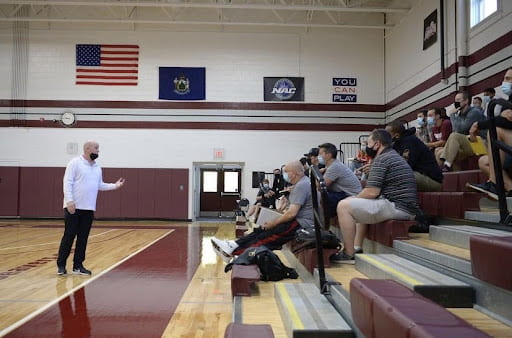
Sep 27, 2021 | Feature, News, Sports, TopStory |
By Michael Levesque, Assistant Editor.
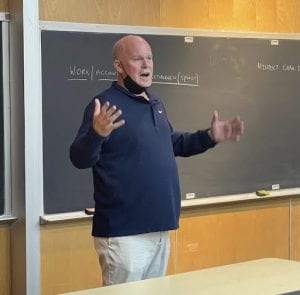
Photo from the UMF Athletic Department
On September 10, 2021, student-athletes and members within the University of Maine Farmington athletics department had the opportunity to listen to alumumnist and National Basketball Association coach, Steve Clifford.
Clifford returned to the college from which he graduated in 1983 to talk about his experience coaching basketball at the highest level. Clifford, who graduated from the university in 1983 with a bachelor’s degree in special education, played basketball for UMF all four years. After graduation, he coached at the high school and college level before accepting a position as an assistant coach for the New York Knicks in 2001. Clifford was an assistant coach in the league for 12 more years before becoming the head coach for the Charlotte Hornets in 2013 and later the Orlando Magic. Today Clifford is a coaching consultant for the Brooklyn Nets.
Clifford first talked to a large group of UMF student athletes, where he touched on values that he believes are not only good for NBA players, but athletes in general. “Work, accountability and togetherness… These are the three main ideas that he focuses on with the NBA teams that he has coached,” said McKenna Brodeur in an email. Brodeur is a captain on the women’s soccer team and a post player on the women’s basketball team. “All three ideas…impact a team’s culture,” she said. “Work requires you to put the effort in. Accountability means having discipline and showing up every day on time, as well as knowing the plays and sets. Lastly, togetherness is the goal of the team,” she said. “You need to be able to play together and have a plan to get better.” Brodeur mentioned that some of the messages she learned, she plans on taking to the soccer field. “I want to bring back what I learned from Coach Clifford back to the team. I think it will be a good reminder on why we cannot just show up to practice and expect greatness. We must work toward our goals and aim to do better every day,” Brodeur said.
Clifford’s visit then transitioned to the basketball court where he conducted a coaching clinic. With UMF men’s basketball players on the court and coaches from around the state in the bleachers, Clifford conducted a few drills and offered coaches advice on running a successful basketball team. “[Clifford] showed us different drills and plays and how they transitioned to success at the NBA level,” said Jack Kane, a center on the men’s basketball team. Kane mentioned how other coaches were there to learn as much from Clifford as they possibly could, including UMF’s own coach Sam Leal. “Coach was taking notes in the stands, listening. He was not ‘coaching’ at all,” said Kane. Kane, like the other members of the team actually completing the drills that day, hopes that what they learned from Clifford can translate to a successful season this winter.
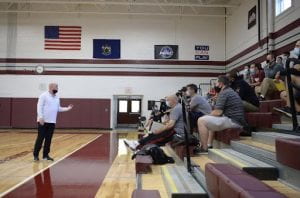
For more photos of Clifford’s visit, check out the athletic department’s instagram page @umfatheltics.
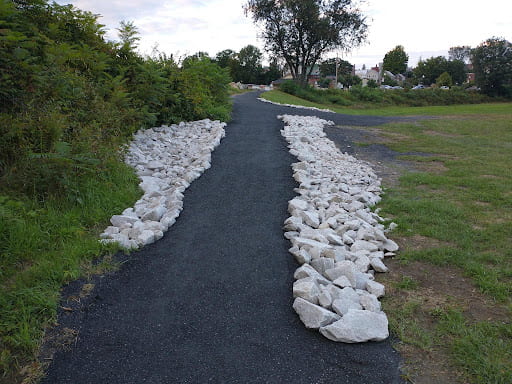
Sep 27, 2021 | Feature, News, Sports, TopStory |
By Adrienne Foss, Contributing Writer.
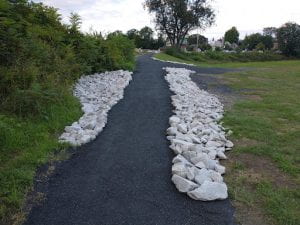

A pre-existing trail surrounding Prescott Field has recently been extended by over half a mile to meet the Americans with Disabilities Act standards and regulations. The highly trafficked trail is used by people all around the community, and the adaptations made will benefit nearly 40% of the Franklin County population according to project organizers.
The High Peaks Alliance is a non-profit organization that played a vital role in the creation of this trail. The organization wanted to know how they could improve the overall accessibility of this piece of land that so many people were already enjoying.
“We realized that there were no accessible trails in all of Franklin County,” Executive Director of the High Peaks Alliance Brent West said. He believes that more people need to get outside and to feel comfortable in the environment they’re in, and having safe and accessible trails is one of the first steps towards meeting that goal. “We hope that the work we do allows for more people to have more opportunities,” West said.
Gina Oswald has worked as a professor in Rehabilitation Services for three years at the University of Maine at Farmington. She has been working for and with people with disabilities for nearly 22 years, and she is always looking for ways to improve general accessibility and to remain inclusive. Oswald has also been a board member of the High Peaks Alliance since 2020 and has since been making extensive contributions to the accessibility aspects of the community. She has worked closely with West to see that this project comes to life. “Being in the field for so long, not only does it keep me passionate about these things, but it keeps me informed about what is and isn’t accessible for all,” Oswald said. “The world is a better place when everybody has the same opportunities and access.”
The ADA trail received funding and grants from multiple organizations in Maine, including the High Peaks Alliance and the Northern Forest Center. The Northern Forest Center provided a $50,000 grant to go towards the project, and the High Peaks Alliance fundraised the rest of the cost. The project added up to a total of $96,000.
The trail now extends from Front Street to the Narrow Gauge parking lot, and it consists of crushed natural and local rock that gives the appearance of smooth pavement. This now provides a safer and more reliable surface for people using a wheelchair, walker, or stroller. There was also a concerted effort to include braille, sign language, and tactile, along with other languages like French and Wabanaki on the informational signs around the trails.
The High Peaks Alliance is constantly seeking additional funding for future projects, and there are big plans for both the Farmington area and Franklin County as a whole.
“We have smaller local goals along with bigger and more grand hopes and dreams,” Oswald said.
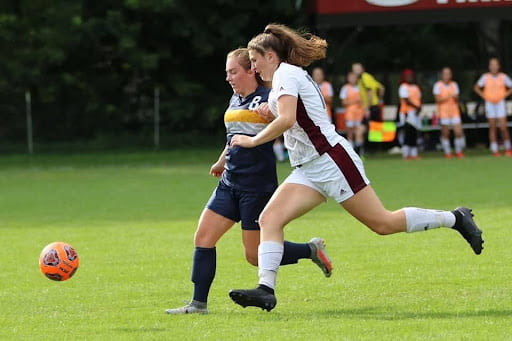
Sep 27, 2021 | Feature, Sports, TopStory |
By Page Brown, Contributing Writer
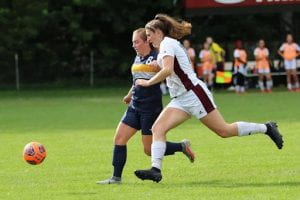
UMF Senior Mckenna Brodeur chases down a ball during a soccer game against the University of Southern Maine.
University of Maine at Farmington student-athletes have returned to the field this year after a full season of Covid-related adjustments. A lack of competition and team interactions coupled with regular testing and mask-wearing took a toll on the mental health of many athletes, who traditionally pride themselves on strength and perseverance. Pushing through a tough practice or game is championed by advertisers, coaches, parents, and society as a whole. Yet, in the post-pandemic world- this narrative has shifted as student-athletes dismantle the warrior mentality and open up about mental health struggles.
The pandemic placed athletes in a vulnerable state, removed from their traditional routine. Researchers at the National Collegiate Athletic Association found that the rates of reported mental health concerns in the fall of 2020 were 1.5 to two times higher than in previous studies.
The increase in reported struggles comes as no surprise to UMF Interim Athletic Director Jamie Beaudoin. “For fifteen years they have had this routine, and COVID has interrupted their routine,” Beaudoin said. “And even though we were able to find ways for teams to practice and compete, it wasn’t what it used to be. This added to student-athletes anxiety as it isn’t what they are used to.”
UMF men’s soccer head coach Blake Hart said he’s seen noticeable shifts in team wellbeing, with players appearing unwilling to practice, nerves surrounding COVID, and poor team chemistry. “As a coach, it was hard to try and lead a team, but more so to watch players not enjoying a pivotal piece in their everyday life,” Hart said.
These struggles were also noticed by women’s soccer player McKenna Brodeur and men’s golf team member Christopher Frey, both pointing towards the lack of team interaction and loss of athletics creating sentiments of anxiety and isolation. Both athletes believe there has been an influx of mental health concerns, and that raising awareness of it and being a supportive outlet for their teammates both mentally and physically is now prioritized. “We all know how fortunate we are to play and we’re enjoying each day together,” Brodeur said.
These comments point to a shift in athletics, with coaches and players alike recognizing the importance of keeping healthy both mentally and physically in order to perform at their full potential. The change in dialogue has been encouraged at UMF. During DIII week last April, UMF athletes attended yoga classes and informational workshops about the importance of resilience and stress management. Guest speakers such as Victoria Garrick, founder of The Hidden Opponent, visited UMF last spring and spoke against the perceived weakness around mental health. Garrick discussed how the lack of visibility paints a misleading portrait on the mental well-being of athletes, an aspect she reiterated in an interview with the New York Times. “I remember Googling and not being able to find anyone or athletes who made me feel less alone.”
Her organization creates the place she was searching for through advocacy programs that argue that being mentally tough is no longer hiding behind a facade of strength, rather it lies in checking in on teammates, speaking up when one is struggling, and advocating for others to do the same. Mental health resources are becoming more readily available and accessible for athletes, granting students a space to grapple with the widespread mental health crisis.
Yet, this is just the beginning of this cultural shift, with Beaudoin using a metaphor to describe the crossing point athletics is at, stating “COVID showed us a bit more of the iceberg. As a coach, I see the tip of the iceberg, but COVID lowered the water and made it so mental health is much more open and out in front of others.” Continuing to hold these conversations and creating spaces for athletes to discuss their mental health changes the paradigm from mental weakness back to strength.
Apr 7, 2021 | Feature, Sports |
By Paige Lilly, Contributing Writer
The UMF Athletics Department recently announced the start of its Racial Equity Committee (REC), which aims to create a safe environment where racially marginalized students can share their experiences while also working to make an impact here on campus. The REC announced its official presence on Monday in an Instagram post.
The group began soon after Molly Wilkie was named the UMF Athletics Diversity and Inclusion designee, a new role the NCAA now requires schools to have. As part of a group of people with this same designation at their respective Maine Division III (DIII) Universities, Wilkie realized that UMF was one of the few schools yet to have a group of this type. “I learned that many of the other schools had coalitions and groups specifically for their student athletes of color [the names of the groups are all slightly different],” Wilkie said in an email. “After learning about what other schools were doing I thought it was something vital that UMF athletics should be engaging in as well.”
Wilkie then reached out to a number of students-athletes who she thought may want to be a part of the group. “Molly emailed us and asked if it would be something we were interested in,” said Chloe Horn, a junior, field hockey player and a member of REC. “I believe she got the list of our names from our various coaches. Then we were able to set up our first meeting.”
Wilkie stressed the importance of student leaders like Horn in the success of the group thus far. “Although I am facilitating this group, it is all about the student-athlete leaders and working to support and amplify their voices and ideas,” said Wilkie.
The group aims to provide students who identify as non-white with a safe space to discuss their experiences. “Our group … wants to create a safe space for racially marginalized student-athletes for support and advocacy,” Wilkie said. “The group also wants to play a role in helping to educate about and identify the racial inequities that exist on our campus.”
“It’s the start of a conversation many students here don’t realize needs to be had,” said sophomore Mullein Francis, who is a nordic skier for UMF and a member of REC. “Because we all go to a school that is mostly white, I think a lot of people think, ‘Oh, it’s rural Maine, we don’t have to worry about that here,’ but in reality we do,” said Francis. “There are a lot of people here who deal with this kind of thing, and it’s good to be able to talk about it with people who understand.”
In fact, it’s that understanding that sparked the friendship between Horn and Francis. “We didn’t know each other before the group, it kind of started our friendship,” Horn said, sharing a laugh with Francis.
In that way, they believe the group is already beginning to be successful in bringing students who identify as non-white together, but they won’t stop there. “We have a lot of big goals,” said Francis. “We are thinking about eventually hopefully having a system where we can include other students as well, not just student athletes.”
However, Francis and Horn both agreed that the group needs a strong foundation before they can move to that goal. “We’re so ambitious, but we know that if we get too excited and try to move too fast it might hurt us in the long run. We know we need to build the group so that it’s strong, doing little events before big ones,” said Horn. In these efforts, these student-athletes believe they will be able to start an important conversation that lasts even after they graduate from UMF.
Any questions about REC should be brought to their Instagram account @umf_rec or emailed to Molly Wilkie at molly.wilkie@maine.edu.
Apr 7, 2021 | Feature, Sports |
By Abby Pomerleau, Contributing Writer
After some sports weren’t able to play games during the fall 2020 athletic season, UMF is planning to have a successful fall athletics season next semester with scheduled games and events.
Teams who could play and practice were restricted to social distancing and wearing masks while practicing and student-athletes had to complete a form before every practice for a COVID-19 screening.
With the 2021 spring season approaching, the North Atlantic Conference (NAC) and the New England Collegiate Conference (NECC), the conferences UMF’s fall athletics play in, are planning competitive games and events. “Travel restrictions will be lifted by next fall, so all things point to us being able to travel and play outside of the state of Maine,” said Cynthia Pratt, head coach of the UMF field hockey team.
Although competitions are taking place, there will still be possible restrictions during the season, such as wearing masks, and the success of the season may depend on factors related to COVID-19 vaccinations. “I am pretty confident about having fall seasons that look and feel more like a normal season,” said Julie Davis, UMF’s Director of Athletics, in an email. “So much will depend on the state of the virus, including the vaccination rate. I won’t be surprised if there is still some masking required we’ve learned when they are used consistently and properly, they work to protect both ourselves and others. I am just hopeful that the context doesn’t require them to the degree they are now.”
Games and events may be resuming as normal, but other aspects of the season may change. “I feel like bus rides and hotel stays are going to look a bit different with more spacing being put in place” said Jonah Sautter, a current junior who plays for the men’s soccer team. Bus rides and hotels are places where teams bond. Having this built-in team bonding time taken away or altered may affect the morale of the team.
In the fall of 2020, teams did practices, but they were not able to compete. Having an entire year off of competition raises concern. “My only worries are for the players on my team and how taking an entire season off might affect them,” said Pratt. “Will they be ready in the fall? Will they once again regain that competitive spirit? It will be my responsibility as a coach to be sure they are focused and prepared. I can give them all the tools and then they have to commit to being the best they can be.”
As the 2021 season rolls around, hopes are high for the competitive season to go as planned. “I’m excited and looking forward to a sense of normalcy,” said Sautter. “It’s crazy to think all of these guidelines and rules have been in place for over a year now, but I just look forward to things beginning to go back to normal.”
The athletic department may have a new normal, but the importance of the game remains the same. “I am excited to coach games,” said Pratt. “I love competition and watching my players compete to the best of their ability. I love watching them get better at practice everyday and taking all the things we work on and apply it to a game situation.”
The expectation regarding fans is that they will be able to attend outdoor games as long as they are wearing masks and social distancing. The plans for the season as well as the topic of fans are subject to change as the fall season becomes closer.
To stay updated on fall athletics or get in contact with staff in the athletic department, visit athletics.umf.maine.edu.
Oct 13, 2020 | Sports |
by Faith Rouillard, Contributing Writer
Over 125 students signed up to participate in kickball, thus launching intramural sports for the 2020-21 school year at UMF.
“Intramural sports are sports leagues that are designed to be played on campus with our UMF community,” said FRC Assistant Director Leah Brackett. Students began with kickball and after a two week season and a one week playoff period, the sport and teams will switch completely.
Games take place four nights a week at the FRC: Sunday, Monday, Wednesday, and Thursday from 8:00-11:00 p.m. Each game takes no more than an hour and not every team plays all four nights. Senior and kickball caption Ella Russel said, “It’s important to move your body, and this a fun way to stay active!”
“Intramurals are very important right now,” said Brackett. “It is a way to keep our students engaged and on campus.”
“Intramural sports provide a way to connect with people on campus that I wouldn’t normally bump into,” said Russel. “Intramurals provide social networking, familiarity with FRC and the amenities it has, and stress relief.” Russel explained how intramural sports are an effective study break. “I recommend intramural sports to the entire student body.”
Typically, the staff provides a variety of sports and activities, including volleyball, kickball, pickleball, indoor soccer, arena football, basketball, dodgeball, among others. This year, the staff has to be cautious in what sports can take place while maintaining social distancing guidelines.
Due to the pandemic, upon arrival students are met at the door by staff members to check-in. They are required to self-screen and report to the staff. “We ask that everyone sanitizes their hands and wear a mask the entire time they are in the building,” said Brackett. The FRC is closed to the public during games and doesn’t allow spectators, limiting the number of people in the building. The staff diligently disinfects equipment periodically during games as well.
Brackett is the intramurals coordinator and leads all student staff. Callie Hammer is this year’s student leader and makes the staff schedules, referees games, “and helps out my amazing boss, Leah Brackett,” she said.
“Our staff dynamics are awesome,” said Brackett. “Working intramural sports teaches confidence and conflict resolution.” A large majority of the student staff are UMF varsity athletes.
“If you’re not on a sports team but still appreciate competition, intramural sports are a great alternative,” said Russel. Many students on varsity teams participate in intramurals but not all that participate in intramurals play varsity sports.
“For old high school athletes, intramurals gives a sense of normalcy for being on a team again,” said Hammer. “Intramurals is a great atmosphere and a lot of the students enjoy participating.”
“My goal is to increase participation in intramural sports,” said Brackett. The 125 students are spread out among nine kickball teams, but there is typically room for up to 16 teams.
“Teams are very simple to set up,” said Russel. “As the captain, I went to the Facebook page and filled out my team’s roster.” To get involved in intramural sports visit their Facebook page (UMF Intramural Sports) or their Instagram page (@umfimsports).
Pickleball will be the next sport to take place. Contact Leah Brackett via email at leah.brackett@maine.edu for any COVID safe suggestions, “We are open to change and always want to do what the students want,” she said.







